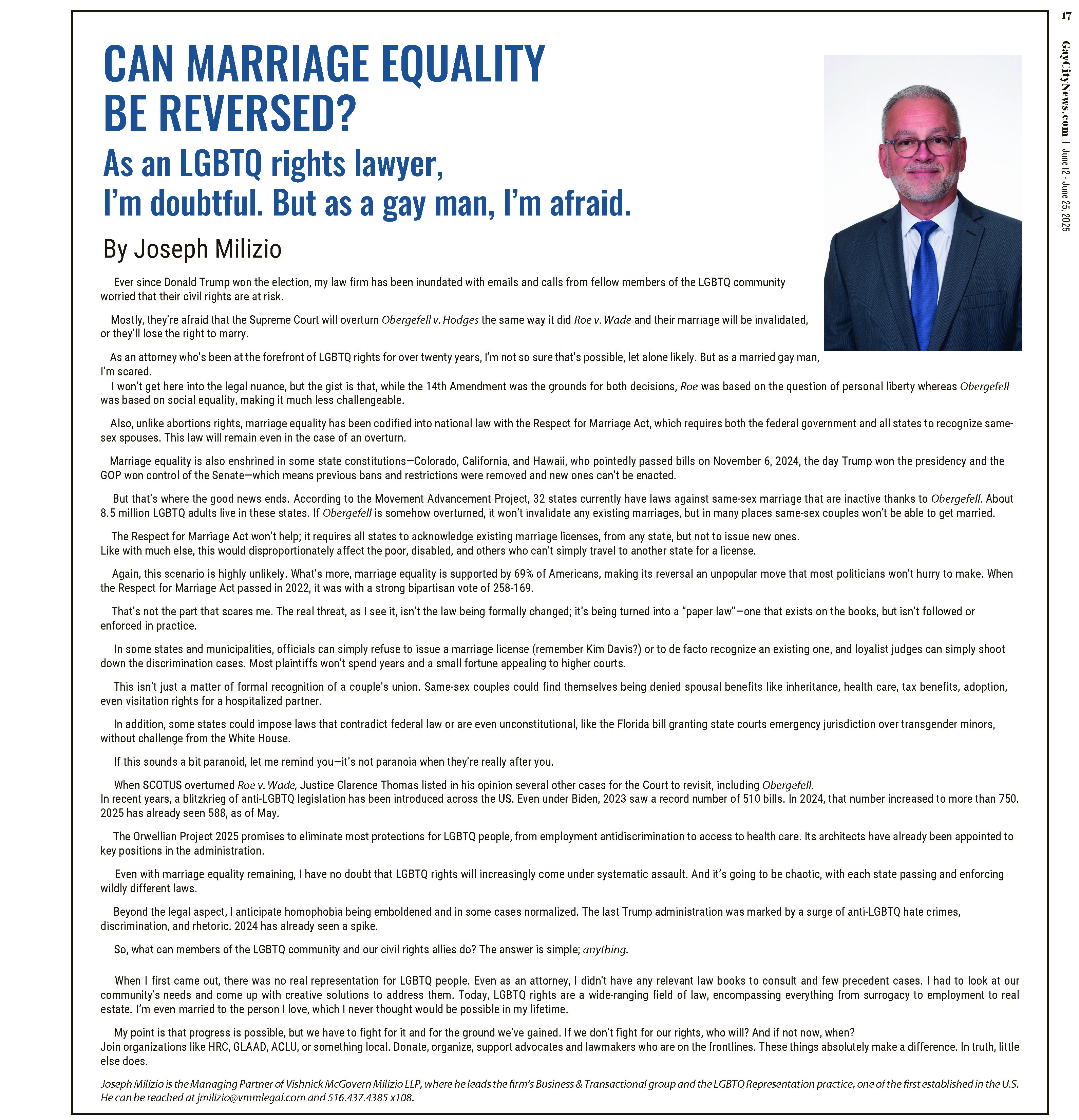Joseph Milizio, VMM managing partner and head of the LGBTQ Representation practice, was invited by Gay City News magazine to write an article for the special NYC Pride Parade issue.
The article appeared in print on June 28. It can be found on page 17 here and below.
A version of the article was also published in Chelsea Community News, and can be found here.


Can marriage equality be reversed? As an LGBTQ rights lawyer, I’m doubtful. But as a gay man, I’m afraid.
Ever since Donald Trump won the election, my law firm has been inundated with emails and calls from fellow members of the LGBTQ community worried that their civil rights are at risk.
Mostly, they’re afraid that the Supreme Court will overturn Obergefell v. Hodges the same way it did Roe v. Wade and their marriage will be invalidated, or they’ll lose the right to marry.
As an attorney who’s been at the forefront of LGBTQ rights for over twenty years, I’m not so sure that’s possible, let alone likely. But as a married gay man, I’m scared.
I won’t get here into the legal nuance, but the gist is that, while the 14th Amendment was the grounds for both decisions, Roe was based on the question of personal liberty whereas Obergefell was based on social equality, making it much less challengeable.
Also, unlike abortions rights, marriage equality has been codified into national law with the Respect for Marriage Act, which requires both the federal government and all states to recognize same-sex spouses. This law will remain even in the case of an overturn.
Marriage equality is also enshrined in some state constitutions—Colorado, California, and Hawaii, who pointedly passed bills on November 6, 2024, the day Trump won the presidency and the GOP won control of the Senate—which means previous bans and restrictions were removed and new ones can’t be enacted.
But that’s where the good news ends. According to the Movement Advancement Project, 32 states currently have laws against same-sex marriage that are inactive thanks to Obergefell. About 8.5 million LGBTQ adults live in these states. If Obergefell is somehow overturned, it won’t invalidate any existing marriages, but in many places same-sex couples won’t be able to get married.
The Respect for Marriage Act won’t help; it requires all states to acknowledge existing marriage licenses, from any state, but not to issue new ones.
Like with much else, this would disproportionately affect the poor, disabled, and others who can’t simply travel to another state for a license.
Again, this scenario is highly unlikely. What’s more, marriage equality is supported by 69% of Americans, making its reversal an unpopular move that most politicians won’t hurry to make. When the Respect for Marriage Act passed in 2022, it was with a strong bipartisan vote of 258-169.
That’s not the part that scares me. The real threat, as I see it, isn’t the law being formally changed; it’s being turned into a “paper law”—one that exists on the books, but isn’t followed or enforced in practice.
In some states and municipalities, officials can simply refuse to issue a marriage license (remember Kim Davis?) or to de facto recognize an existing one, and loyalist judges can simply shoot down the discrimination cases. Most plaintiffs won’t spend years and a small fortune appealing to higher courts.
This isn’t just a matter of formal recognition of a couple’s union. Same-sex couples could find themselves being denied spousal benefits like inheritance, health care, tax benefits, adoption, even visitation rights for a hospitalized partner.
In addition, some states could impose laws that contradict federal law or are even unconstitutional, like the Florida bill granting state courts emergency jurisdiction over transgender minors, without challenge from the White House.
If this sounds a bit paranoid, let me remind you—it’s not paranoia when they’re really after you.
When SCOTUS overturned Roe v. Wade, Justice Clarence Thomas listed in his opinion several other cases for the Court to revisit, including Obergefell.
In recent years, a blitzkrieg of anti-LGBTQ legislation has been introduced across the US. Even under Biden, 2023 saw a record number of 510 bills. In 2024, that number increased to more than 750. 2025 has already seen 588, as of May.
The Orwellian Project 2025 promises to eliminate most protections for LGBTQ people, from employment antidiscrimination to access to health care. Its architects have already been appointed to key positions in the administration.
Even with marriage equality remaining, I have no doubt that LGBTQ rights will increasingly come under systematic assault. And it’s going to be chaotic, with each state passing and enforcing wildly different laws.
Beyond the legal aspect, I anticipate homophobia being emboldened and in some cases normalized. The last Trump administration was marked by a surge of anti-LGBTQ hate crimes, discrimination, and rhetoric. 2024 has already seen a spike.
So, what can members of the LGBTQ community and our civil rights allies do? The answer is simple; anything.
When I first came out, there was no real representation for LGBTQ people. Even as an attorney, I didn’t have any relevant law books to consult and few precedent cases. I had to look at our community’s needs and come up with creative solutions to address them. Today, LGBTQ rights are a wide-ranging field of law, encompassing everything from surrogacy to employment to real estate. I’m even married to the person I love, which I never thought would be possible in my lifetime.
My point is that progress is possible, but we have to fight for it and for the ground we’ve gained. If we don’t fight for our rights, who will? And if not now, when?
Join organizations like HRC, GLAAD, ACLU, or something local. Donate, organize, support advocates and lawmakers who are on the frontlines. These things absolutely make a difference. In truth, little else does.



